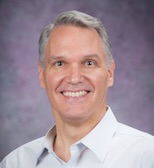August 20, 2019
Head of psychological sciences elected to chair board of national organization
Submitted by College of Arts and Sciences

Michael Young, head of the psychological sciences department since 2012, was elected to chair the board of directors of the Council of Graduate Departments of Psychology. He was elected to the board by the organization's membership in 2017 to serve a three-year term from 2018-2021, and his one-year term as chair begins in February 2020.
The council is comprised of chairs and heads of departments of psychology or other equivalent administrative units that are accredited to offer graduate degrees in psychology. Membership in the organization is by department, not individual. Approximately 250 departments are members of the council, including nine of the 10 Big 12 psychology departments.
The organization was formed in 1963 to facilitate the professional development of psychology department leaders at research universities. A major responsibility of the council's board of directors is the organization of the annual meeting in February that provides numerous workshops, networking opportunities and presentations by national leaders.
Although leading the council will entail new responsibilities, Young has already played key roles since his election to the board. At the February 2019 conference, Young co-led workshops on department fundraising, the science of faculty evaluation, and graduate methodological training in psychology, as well as facilitating networking events. He has also maintained the society's website and job board since joining the board of directors.
"I've been involved with the council since becoming a department head, and the organization has been critical to my development as a leader in my department," Young said. "I'm honored to have the opportunity to pay it forward by helping emerging leaders across the country."
The psychological sciences department is in the College of Arts and Sciences and seeks to enlighten our understanding of the diversity of human experience that drives behavior as well as to shed light on the mind's mechanisms that underlie this behavior. To learn more, visit k-state.edu/psych.
